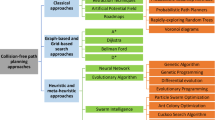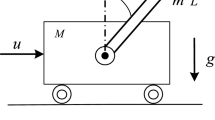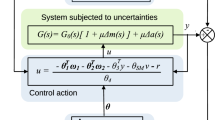Abstract
This paper presents a new method for adaptive continuous nonsingular fast terminal sliding mode control (ACNFTSMC) based on a novel structure-improved extended state observer (SIESO) for fault-tolerant control (FTC). In response to the initial peaking phenomenon in traditional ESO (TESO), which can severely degrade the accuracy and stability of the control system, The SIESO is designed to replace TESO to estimate the lump disturbances/faults. Besides, to address the problem of the unknown estimation error of ESO, an adaptive technique is applied to compensate for the observation error in real-time. To guarantee fast convergence and chattering-free, the CNFTSMC method is employed. Afterward, the stability and rapid convergence of the control system is demonstrated using Lyapunov theory. Finally, the simulation results verify the superiority of the proposed control strategy compared to the other existing advanced control techniques.
Similar content being viewed by others
References
E. C. Wu, J. C. Hwang, and J. T. Chladek, “Fault-tolerant joint development for the space shuttle remote manipulator system: Analysis and experiment,” IEEE Transactions on Robotics and Automation, vol. 9, no. 5, pp. 675–684, 1993.
B. Zhao, R. Skjetne, M. Blanke, and F. Dukan, “Particle filter for fault diagnosis and robust navigation of underwater robot,” IEEE Transactions on Control Systems Technology, vol. 22, no. 6, pp. 2399–2407, 2014.
M. Van, X. P. Do, and M. Mavrovouniotis, “Self-tuning fuzzy PID-nonsingular fast terminal sliding mode control for robust fault tolerant control of robot manipulators,” ISA Transactions, vol. 96, pp. 60–68, 2020.
M. Van and X. P. Do, “Optimal adaptive neural pi full-order sliding mode control for robust fault tolerant control of uncertain nonlinear system,” European Journal of Control, vol. 54, pp. 22–32, 2020.
M. Van, S. S. Ge, and D. Ceglarek, “Fault estimation and accommodation for virtual sensor bias fault in image-based visual servoing using particle filter,” IEEE Transactions on Industrial Informatics, vol. 14, no. 4, pp. 1312–1322, 2017.
A. Bregon, C. J. Alonso-González, and B. Pulido, “Integration of simulation and state observers for online fault detection of nonlinear continuous systems,” IEEE Transactions on Systems, Man, and Cybernetics: Systems, vol. 44, no. 12, pp. 1553–1568, 2014.
H. A. Talebi, K. Khorasani, and S. Tafazoli, “A recurrent neural-network-based sensor and actuator fault detection and isolation for nonlinear systems with application to the satellite’s attitude control subsystem,” IEEE Transactions on Neural Networks, vol. 20, no. 1, pp. 45–60, 2008.
S.-J. Huang, D.-Q. Zhang, L.-D. Guo, and L.-B. Wu, “Convergent fault estimation for linear systems with faults and disturbances,” IEEE Transactions on Automatic Control, vol. 63, no. 3, pp. 888–893, 2017.
M. Van, S. S. Ge, and H. Ren, “Finite time fault tolerant control for robot manipulators using time delay estimation and continuous nonsingular fast terminal sliding mode control,” IEEE Transactions on Cybernetics, vol. 47, no. 7, pp. 1681–1693, 2016.
B. Brahmi, M. Driscoll, I. K. El Bojairami, M. Saad, and A. Brahmi, “Novel adaptive impedance control for exoskeleton robot for rehabilitation using a nonlinear time-delay disturbance observer,” ISA Transactions, 2020.
S. K. Kommuri, S. B. Lee, and K. C. Veluvolu, “Robust sensors-fault-tolerance with sliding mode estimation and control for pmsm drives,” IEEE/ASME Transactions on Mechatronics, vol. 23, no. 1, pp. 17–28, 2017.
H. Rabiee, M. Ataei, and M. Ekramian, “Continuous nonsingular terminal sliding mode control based on adaptive sliding mode disturbance observer for uncertain nonlinear systems,” Automatica, vol. 109, p. 108515, 2019.
C. M. Nguyen, C. P. Tan, and H. Trinh, “Sliding mode observer for estimating states and faults of linear time-delay systems with outputs subject to delays,” Automatica, p. 109274, 2020.
M. Van and D. Ceglarek, “Robust fault tolerant control of robot manipulators with global fixed-time convergence,” Journal of the Franklin Institute, vol. 358, no. 1, pp. 699–722, 2021.
J. Han, “From pid to active disturbance rejection control,” IEEE Transactions on Industrial Electronics, vol. 56, no. 3, pp. 900–906, 2009.
B. Li, K. Qin, B. Xiao, and Y. Yang, “Finite-time extended state observer based fault tolerant output feedback control for attitude stabilization,” ISA Transactions, vol. 91, pp. 11–20, 2019.
X. Li, C. Ren, S. Ma, and X. Zhu, “Compensated model-free adaptive tracking control scheme for autonomous underwater vehicles via extended state observer,” Ocean Engineering, vol. 217, p. 107976, 2020.
Y. Kang, L. Yao, and W. Wu, “Sensor fault diagnosis and fault tolerant control for the multiple manipulator synchronized control system,” ISA Transactions, 2020.
A. Izadbakhsh, S. Khorashadizadeh, and P. Kheirkhahan, “Tracking control of electrically driven robots using a model-free observer,” Robotica, vol. 37, no. 4, pp. 729–755, 2019.
Z. Zhao and B. Guo, “A novel extended state observer for output tracking of mimo systems with mismatched uncertainty,” IEEE Transactions on Automatic Control, vol. 63, no. 1, pp. 211–218, 2017.
Y. Xia, M. Fu, C. Li, F. Pu, and Y. Xu, “Active disturbance rejection control for active suspension system of tracked vehicles with gun,” IEEE Transactions on Industrial Electronics, vol. 65, no. 5, pp. 4051–4060, 2017.
B. Li, Q. Hu, and Y. Yang, “Continuous finite-time extended state observer based fault tolerant control for attitude stabilization,” Aerospace Science and Technology, vol. 84, pp. 204–213, 2019.
C. Ren, Y. Ding, and S. Ma, “A structure-improved extended state observer based control with application to an omnidirectional mobile robot,” ISA Transactions, vol. 101, pp. 333–345, 2021.
S. Dian-sheng and Y.-j. Zhang, “Improved third-order time-varying parameters nonlinear eso restraining the derivative peaking phenomenon,” Electric Machines and Control, vol. 21, no. 9, pp. 55–62, 2017.
B. Zhao and Y. Li, “Local joint information based active fault tolerant control for reconfigurable manipulator,” Nonlinear Dynamics, vol. 77, no. 3, pp. 859–876, 2014.
H. Gao, Y. Song, and C. Wen, “Backstepping design of adaptive neural fault-tolerant control for MIMO nonlinear systems,” IEEE Transactions on Neural Networks and Learning Systems, vol. 28, no. 11, pp. 2605–2613, 2016.
H. Badihi, S. Jadidi, Y. Zhang, P. Pillay, and S. Rakheja, “Fault-tolerant cooperative control in a wind farm using adaptive control reconfiguration and control reallocation,” IEEE Transactions on Sustainable Energy, vol. 11, no. 4, pp. 2119–2129, 2020.
H. Ye and S. Wang, “Trajectory tracking control for nonholonomic wheeled mobile robots with external disturbances and parameter uncertainties,” International Journal of Control, Automation and Systems, vol. 18, no. 12, pp. 3015–3022. 2020.
G. Zhao, G. Chen, J. Chen, and C. Hua, “Finite-time control for image-based visual servoing of a quadrotor using nonsingular fast terminal sliding mode,” International Journal of Control, Automation and Systems, vol. 18, no. 9, pp. 2337–2348, 2020.
M. Van, M. Mavrovouniotis, and S. S. Ge, “An adaptive backstepping nonsingular fast terminal sliding mode control for robust fault tolerant control of robot manipulators,” IEEE Transactions on Systems, Man, and Cybernetics: Systems, vol. 49, no. 7, pp. 1448–1458, 2018.
L. Sun and Y. Liu, “Extended state observer augmented finite-time trajectory tracking control of uncertain mechanical systems,” Mechanical Systems and Signal Processing, vol. 139, p. 106374, 2020.
N. Ali, I. Tawiah, and W. Zhang, “Finite-time extended state observer based nonsingular fast terminal sliding mode control of autonomous underwater vehicles,” Ocean Engineering, vol. 218, p. 108179, 2020.
Y. Wang, K. Zhu, B. Chen, and M. Jin, “Model-free continuous nonsingular fast terminal sliding mode control for cable-driven manipulators,” ISA Transactions, vol. 98, pp. 483–495, 2020.
A. T. Vemuri and M. M. Polycarpou, “A methodology for fault diagnosis in robotic systems using neural networks,” Robotica, vol. 22, no. 4, p. 419, 2004.
Z. Zuo, D. W. Ho, and Y. Wang, “Fault tolerant control for singular systems with actuator saturation and nonlinear perturbation,” Automatica, vol. 46, no. 3, pp. 569–576, 2010.
S. E. Talole, J. P. Kolhe, and S. B. Phadke, “Extended-state-observer-based control of flexible-joint system with experimental validation,” IEEE Transactions on Industrial Electronics, vol. 57, no. 4, pp. 1411–1419, 2009.
S. Yi and J. Zhai, “Adaptive second-order fast nonsingular terminal sliding mode control for robotic manipulators,” ISA Transactions, vol. 90, pp. 41–51, 2019.
J. Su, J. Yang, and S. Li, “Continuous finite-time anti-disturbance control for a class of uncertain nonlinear systems,” Transactions of the Institute of Measurement and Control, vol. 36, no. 3, pp. 300–311, 2014.
Y. Feng, X. Yu, and Z. Man, “Non-singular terminal sliding mode control of rigid manipulators,” Automatica, vol. 38, no. 12, pp. 2159–2167, 2002.
L. Qiao and W. Zhang, “Adaptive second-order fast nonsingular terminal sliding mode tracking control for fully actuated autonomous underwater vehicles,” IEEE Journal of Oceanic Engineering, vol. 44, no. 2, pp. 363–385, 2018.
Author information
Authors and Affiliations
Corresponding author
Additional information
Publisher’s Note Springer Nature remains neutral with regard to jurisdictional claims in published maps and institutional affiliations.
This work was funded by the Special Fund for Graduate Innovation of Nanchang University (YC2020-S097) and supported by the National Natural Science Foundation of China (51765042, 61963026).
Wenjie Zhang received his B.E. degree in electrical engineering and its automation from Heilongjiang University of Science and Technology, Heilongjiang, China, in 2019, Now, he is pursuing an M.E. degree in electric engineering in Nanchang University. His current research interests include trajectory tracking and fault-tolerant control of mechanical systems, robotics and nonlinear systems.
Xiaohui Yang received his B.Sc. M.Sc., and Ph.D. degrees from Nanchang University, Nanchang, China, in 2003, 2006, and 2015, respectively (email: yangxiaohui@ncu.edu.cn). He has been with the Department of Electronic Information Engineering, School of Information Engineering, Nanchang University, since 2006, where he is currently an Associate Professor. He has published over 30 research articles. His current interests include intelligent control, process control, fault diagnosis and stochastic nonlinear systems etc.
Zhenghong Xu received his B.E. degree in mineral process engineering from North China Institute of Science and Technology, Langfang, China, in 2018. Now, he is pursuing an M.E. degree in electric engineering in Nanchang University. His current research interests include sliding mode control and observers, adaptive nonlinear control of robotic manipulators.
Wei Zhang received his B.E. degree in electrical engineering and its automation from Nanchang University, Nanchang, China, in 2018. Now, he is pursuing an M.E. degree in electric engineering in Nanchang University. His current research interests include sliding mode control, adaptive non-linear control of robotic manipulator, and the control of phase selection of the closing circuit-breaker.
Li Yang was born in 1975 and received her master’s degree in engineering. She is employed in the Department of Energy and Electrical Engineering, School of Information Engineering, Nanchang University. Currently, her main research interests include electrical appliances and motor control.
Xiaoping Liu is with the Department of Systems and Computer Engineering, Carleton University, Ottawa, Canada. He received his B.Sc. and M.Sc. degrees from Northern Jiaotong University, China, in 1992 and 1995, respectively, and a Ph.D. degree from the University of Alberta, Canada in 2002. He has been with the Department of Systems and Computer Engineering, Carleton University, Canada since July 2002 and he is currently a Professor and Canada Research Chair. He is also with the School of Information Engineering, Nanchang University as an Adjunct Professor. His interest includes interactive networked systems and teleoperation, haptics, micro-manipulation, robotics, intelligent systems, context-aware intelligent networks, and their applications to biomedical engineering. Dr. Liu has published more than 280 research articles. He serves as an Associate Editor for several journals including IEEE Transactions on Cybernetics, IEEE/ASME Transactions on Mechatronics, IEEE Transactions on Automation Science and Engineering, and IEEE Access. He received a 2007 Carleton Research Achievement Award, a 2006 Province of Ontario Early Researcher Award, a 2006 Carty Research Fellowship, the Best Conference Paper Award of the 2006 IEEE International Conference on Mechatronics and Automation, and a 2003 Province of Ontario Distinguished Researcher Award. Dr. Liu is a licensed member of the Professional Engineers of Ontario (P.Eng), a senior member of IEEE and Fellow of Engineering Institute of Canada (FEIC).
Rights and permissions
About this article
Cite this article
Zhang, W., Yang, X., Xu, Z. et al. An Adaptive Fault-tolerant Control Method for Robot Manipulators. Int. J. Control Autom. Syst. 19, 3983–3995 (2021). https://doi.org/10.1007/s12555-020-0920-9
Received:
Revised:
Accepted:
Published:
Issue Date:
DOI: https://doi.org/10.1007/s12555-020-0920-9




